三角比の相互関係
斜辺の長さが \(1\) の直角三角形
サインとコサインを長さとして扱う
三角比は角度のみで定まり、直角三角形のサイズには無関係であることを
確認しました。
そこで・・・
斜辺の長さが \(1\) の直角三角形で三角比を見てみましょう。
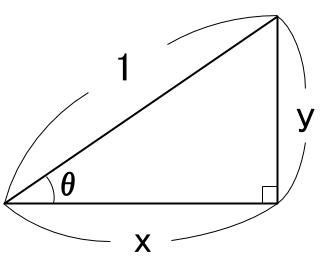
サインとコサインは以下のようになります。
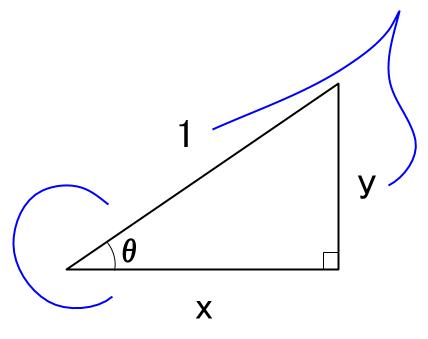
サイン
\(\sin \theta=\displaystyle \frac{y}{1}=y\)
コサイン
\(\cos \theta=\displaystyle \frac{x}{1}=x\)
つまり、\(\sin \theta\) と \(\cos \theta\) の値を「直角三角形の辺の長さ」として
扱うことができるようになりました。
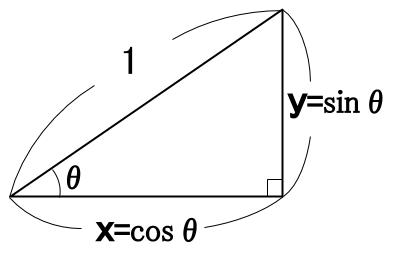
比という漠然とした値を扱うよりも、
「長さ」という具体物を扱う方がいろいろ考えやすいことも多いでしょう。
今後はこの、斜辺の長さが \(1\) の直角三角形もどんどん活用していきます。
タンジェントは、直線の傾き
\(\tan \theta=\displaystyle \frac{y}{x}\)
タンジェントは、斜辺の長さとは無関係な値です。
タンジェントは、直線の傾きです。
中学 \(2\) 年生のときに学習した \(1\) 次関数の傾きです。
斜辺の傾きを表しています。
三角比の相互関係
三角比の相互関係として、代表的な \(3\) つの式があります。
必ず暗記しましょう。
- \(\sin^2 \theta +\cos^2 \theta =1\)
- \(\tan \theta=\displaystyle \frac{\sin \theta}{\cos \theta}\)
- \(\tan^2 \theta+1=\displaystyle \frac{1}{\cos^2 \theta}\)
以下、どのように導かれるのかを見ていきましょう。
三角比の相互関係の導出
タンジェントに関して、以下の式が成り立ちます。
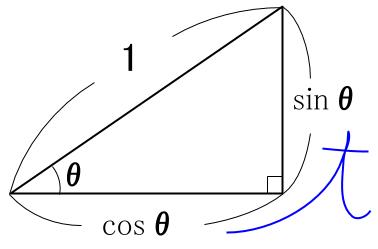
\(\tan \theta=\displaystyle \frac{\sin \theta}{\cos \theta}\)
これは \(2\) つめの式になります。
さらに、この直角三角形に三平方の定理を適用すると、
\(1\) つめの式が導かれます。
\(\sin \theta × \sin \theta+\cos \theta × \cos \theta=1^2\)
ちなみに、\(\sin \theta × \sin \theta=\sin^2 \theta\) と表記します。
ただの決め事なので覚えるしかありません。
この表記で改めて三角比の相互関係・その1をかきます。
\(\sin^2 \theta +\cos^2 \theta =1\)
この式の両辺を \(\cos^2 \theta\) で割ると
\(\displaystyle \frac{\sin^2 \theta}{\cos^2 \theta}+\displaystyle \frac{\cos^2 \theta}{\cos^2 \theta}=\displaystyle \frac{1}{\cos^2 \theta}\)
\(\tan \theta=\displaystyle \frac{\sin \theta}{\cos \theta}\) なので
\(\tan^2 \theta=\displaystyle \frac{\sin^2 \theta}{\cos^2 \theta}\) であり、これを使うと
\(\tan^2 \theta+1=\displaystyle \frac{1}{\cos^2 \theta}\)
これで \(3\) つめの式が導けました。
\(1\) つめと \(2\) つめの式は直感的な理解をしてください。
\(3\) つめは公式として覚えておきましょう。
例題1
\(\sin \theta=\displaystyle \frac{1}{3}\) のとき、\(\cos \theta\) と \(\tan \theta\) の値を求めなさい。ただし \(\theta\) は鋭角とする。
解説
先の三角比の相互関係を使えば、ただの計算問題です。
\(\sin^2 \theta +\cos^2 \theta =1\)
に、\(\sin \theta=\displaystyle \frac{1}{3}\) を代入すれば、
\(\cos^2 \theta=\displaystyle \frac{8}{9}\)
\(\cos \theta=\pm \sqrt{\displaystyle \frac{8}{9}}\)
\(\theta\) は鋭角なので、\(\cos \theta\) は \(0\) より大きい。
よって、
\(\cos \theta= \sqrt{\displaystyle \frac{8}{9}}\)
\(=\displaystyle \frac{2\sqrt{2}}{3}\)
また、
\(\tan \theta=\displaystyle \frac{\sin \theta}{\cos \theta}\)
に、\(\sin \theta=\displaystyle \frac{1}{3}\) と \(\cos \theta=\displaystyle \frac{2\sqrt{2}}{3}\)
を代入すれば、\(\tan \theta\) が求まる。
\(\tan \theta=\displaystyle \frac{\sin \theta}{\cos \theta}\)
とは、
\(\tan \theta=\sin \theta ÷ \cos \theta\)
のことなので、
\(\tan \theta=\displaystyle \frac{1}{3} ÷ \displaystyle \frac{2\sqrt{2}}{3}\)
\(=\displaystyle \frac{1}{2\sqrt{2}}= \displaystyle \frac{\sqrt{2}}{4}\)
別解1
\(\sin \theta=\displaystyle \frac{1}{3}\) となる直角三角形をかいてみましょう。
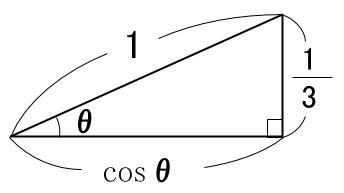
あとは三平方の定理を使えば、直角三角形の横の長さ、 \(\cos \theta\) が求まります。
\(\cos \theta=\displaystyle \frac{2\sqrt{2}}{3}\)
\(\tan \theta\) は定義どおり計算します。
別解2
もちろん、斜辺が \(1\) でない直角三角形で解いても構いません。
\(\sin \theta=\displaystyle \frac{1}{3}\) なのですから下図です。
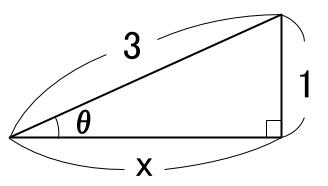
三平方の定理で \(x\) を求めて、
あとは三角比の定義通りに比の値を求めます。
こちらの方が計算が楽かもしれまんせん。
例題2
\(\tan \theta=3\) のとき、\(\sin \theta\) と \(\cos \theta\) の値を求めなさい。ただし \(\theta\) は鋭角とする。
解説
相互関係からガツガツ計算して解いてもよし。
図形的に解いてもよし。
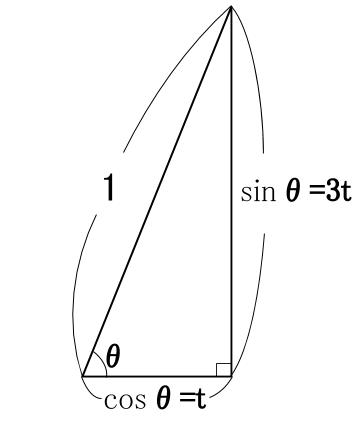
この図で解くならば、三平方の定理より
\(1^2=t^2+(3t)^2\)
\(t\) は \(0\) より大きいので
\(t=\displaystyle \frac{\sqrt{10}}{10}\)
よって
\(\cos \theta=t=\displaystyle \frac{\sqrt{10}}{10}\)
\(\sin \theta=3t=\displaystyle \frac{3\sqrt{10}}{10}\)